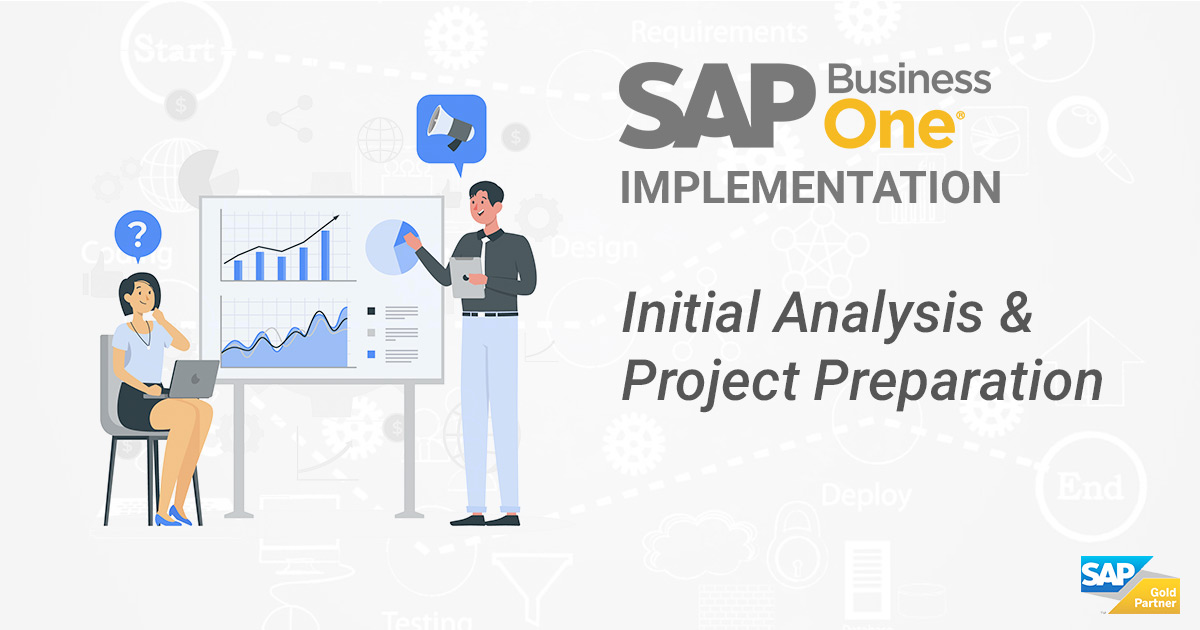Today’s dynamic business environment demands enterprises, whether micro, small, medium or large to seek out robust ERP solutions that can aid in streamlining operations, improve productivity, and gain a competitive edge.
SAP Business One, designed specifically for SMEs, offers a comprehensive suite of tools to manage financials, sales, inventory, customer relations, and more.
However, a successful SAP Business One implementation hinges on a thorough initial analysis that lays the groundwork for a seamless transition.
In our previous blog about implementation, we explained to you what a proven implementation looks like and the various integral processes that a precise implementation methodology consists of.
Today, in this blog, we will delve further into the very first step among the other crucial steps involved in implementing SAP Business One– “Initial Analysis & Project Preparation”. The very first step of a foolproof SAP Business One implementation strategy.
In summary, once you are done selecting your preferred SAP Business One implementation partner, their team gets in touch with your assembled project team, conducts initial analysis, takes notes of your unique requirements and then drafts a plan and blueprints for further action accordingly and more.
Let’s dive a little deeper into the Initial Analysis process:
Defining Objectives
Before embarking on the ERP implementation journey, defining clear and tangible objectives is essential. A proven partner like us works with companies to assess their existing pain points, challenges, and long-term business goals. Whether it is optimizing inventory management, streamlining financial processes, or enhancing customer relationship management, outlining precise objectives serves as a guiding light throughout the project.
Assembling the Project Team
Implementing SAP Business One is a collaborative effort that requires cross-functional expertise. Just like we create a Project team of our experts, we ask the clients to come up with one of their own representing the various departments and perspectives of their business. Once done, we get in touch with them and through their diverse ideas and invaluable insights, ideas are floated around, fostering a more holistic approach to the implementation process.
Needs Assessment & Data Analysis
In the needs assessment phase, a thorough evaluation of the company’s existing business processes, systems, and data is conducted. Gaps and pain points are identified which help tailor the SAP Business One implementation to specific requirements. Once done, data analysis is performed for a comprehensive review of existing data to identify inconsistencies, duplicates, and errors. Data clean-up and standardization activities are essential to lay the foundation for reliable reporting and effective system performance.
Infrastructure Readiness
Though SAP Business One is offered both – On-premises and on the cloud, infrastructure readiness is still paramount. A robust IT infrastructure is critical for a smooth SAP Business One implementation. As part of the initial analysis, assessing the existing hardware, network capabilities, and system compatibility is second nature. This is done to determine if any upgrades or modifications are necessary and to ensure infrastructure readiness to prevent technical roadblocks during the implementation phase.
Defining Scope, Timeline & Budget Planning
And last but not least, defining scope, timeline and planning budget. In this crucial stage of the SAP Business One implementation project, the partner helps you determine modules and functionalities and establishes a realistic timeline with achievable milestones. This is also the opportune time to plan the project budget. Costs of licenses, hardware, infrastructure upgrades, training, consulting services and everything in between are considered in budget planning and presented to the clients.
Project Preparation starts once the Initial Analysis has been concluded. For an implementation partner, the key activities in this stage are:
- Conduct a project handover with the sales team
- Create a project plan for the implementation
- Conduct an official kick-off meeting with the customer team
- Deliver and install the SAP Business One software and demo database at the customer site.
The initial analysis & project preparation for SAP Business One implementation sets the stage for a successful and transformative ERP journey.
By defining objectives, assembling the right team, conducting a needs assessment, and planning diligently, ERP partners ensure a smooth transition to SAP Business One.
With a robust foundation in place, organizations can leverage the full potential of SAP Business One to drive growth, efficiency, and profitability.
